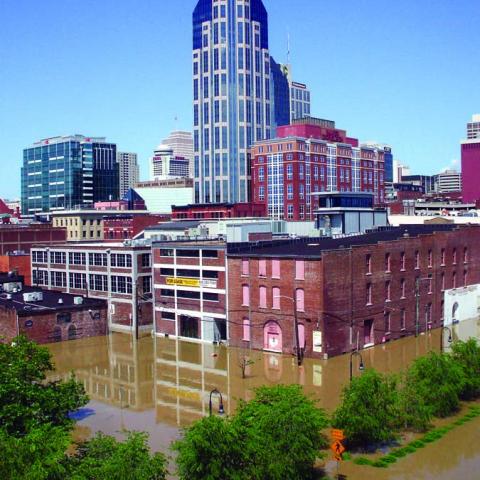Nashville Notes

Downtown Nashville after the May flood caused an estimated $1 billion in damage.
Ordinarily, this column is reserved for exciting news about alumni in Nashville. Announcements of songwriters garnering cuts, bands inking record deals, alumni tying the knot, and other happy events usually appear here. This time, however, I’d like to share a different kind of experience that has affected not only our Nashville-based Berklee family but also all residents throughout the state of Tennessee. I share this because it’s something that, surprisingly, didn’t net the national attention commensurate with its magnitude.
During the early hours of Saturday, May 1, it started to rain—nothing new for this time of year in Nashville, where severe thunderstorms and tornado warnings are a sign of the season. But this time was different. For nearly two full days, it rained and rained. What resulted was a very serious natural disaster. Nashville and middle Tennessee received more rain than had ever been recorded in the region.
All felt the impact of this catastrophe. Those lucky enough to live on the highest ground might have just had flooded basements or leaky roofs, but others were not so lucky. Entire homes were lost, including that of country music superstar Kenny Chesney. Songwriter and artist Julie Roberts and her family were rescued through a second-story window of their home. Millions of dollars’ worth of valuable equipment was lost when Soundcheck, an instrument storage facility, flooded. Major roadways became raging aqueducts, tossing cars and piling them up. There were 18-wheelers and a school annex seen floating down Interstate 24. Surreal is the only word that comes close to describing the scene.
The Cumberland River, which runs through Nashville, swelled to a staggering 51.9 feet at its crest, 12 feet above flood stage. The water covered nearly four city blocks of Nashville’s famous lower Broadway. Inside LP Field, home to the Tennessee Titans, a small lake formed that reached the first row of seats in the stadium. The price tag for its cleanup and restoration is estimated at $2.4 million. The Schermerhorn Symphony Center needs $15 million for repairs. The Country Music Hall of Fame and Museum suffered $300,000 in damage. Other historic landmarks that are synonymous with Nashville were badly damaged. The Grand Ole Opry and Opryland Hotel evacuated thousands of guests only hours before the building flooded. This popular tourist destination will remain closed for about a year. Total estimated damages across the state now hover at $1 billion. Of course, homes and businesses can be rebuilt, but there is no replacing the lives of more than 30 people who were lost during the Tennessee flood.
If you have friends or family in Nashville, perhaps you’ve heard these figures before. If not, you may have learned through passing news reports or social-media posts that, yes, we experienced some bad weather in these parts, but few specifics. There are numerous theories as to why this disaster didn’t garner more national-media attention. There’s no denying that, as our streets flooded, the BP oil rig explosion and the Times Square bombing attempt leapt onto the national stage and seized the headlines.
In a way, it is ironic that a town that built its legacy on storytelling and heart-wrenching love songs lacked the compelling narrative to maintain a spot in the blog-crazed, 24-hour national news cycle.
Nevertheless, several weeks after the waters receded, our “story” continues. Community-volunteer efforts that began before the rains subsided have continued with inspiring consistency. Neighbors who had shared property lines for years but had never met face to face worked arm in arm in rescue efforts, cleaning out flood-damaged homes and beginning to rebuild their communities, creating true habitats for humanity. For further perspective on the flood presented as only Nashville’s finest could in music and video, visit www.cityofdreamsnashville.com.
The ripple effects of the flood of 2010 will be felt for years to come. But as middle Tennessee continues to progress toward something that resembles normalcy, camaraderie and resolve have only strengthened in our communities. Proof again that some good can come out of the worst of circumstances. In this case, to paraphrase a current single on country radio, “Rain just might bring some good things after all.”
Dave Petrelli ’05
Nashville Berklee Alumni
Chapter Leader




